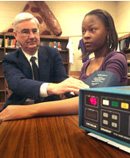
|
|
Helping children with high blood pressure Nick Fitts, an African American who learnt Maharishi’s Transcendental Meditation several years ago as a high school student involved in a study on teens and high blood pressure, seems very gratified by his experience. Reflecting on his life before his instruction in Transcendental Meditation, Nick expressed his feelings that he ‘was heading in the wrong direction’ and that he ‘had a lot of problems to worry about'. Thinking about the effect of the practice, he said, ‘Transcendental Meditation not only helped me reduce my high blood pressure, but it has also been a major problem solver in my life. The technique calmed me down and settled my mind to give me a better focus—it raised my study habits to a whole new level. In a year and a half, I went from a 3.2 to a 3.7—which is "A" level.’ Studying the effect of Transcendental Meditation on students with high blood pressure While this research was the first of its kind on adolescents, the nature of the grant—for a study of the Transcendental Meditation Programme and high blood pressure—has had a long precedent. During the past 15 years, the National Institutes of Health has granted over $20 million to study the effects of Transcendental Meditation on hypertension in elderly African Americans—findings that were published in the American Heart Association’s ‘Hypertension and Stroke’, as well as in the ‘American Journal of Cardiology’. Dr Barnes was motivated to perform the research by the fact that one of twelve American teenagers is suffering from high blood pressure, the percentage skyrocketing to one in five African American teens. And he was inspired by the positive results of earlier studies on the use of Transcendental Meditation in treating hypertension. He explains, ‘There is considerable research to suggest that stress contributes to hypertension and coronary heart disease. This evidence has led to the increasing use of stress reduction techniques in the prevention and treatment of these illnesses. Based on previous research with Transcendental Meditation, which has been shown to significantly lower blood pressure in hypertensive adults, we hypothesized that a similar approach would be fruitful in adolescents. The purpose of our study was to evaluate the impact of TM on ambulatory blood pressure—that is, blood pressure measured in the natural setting—in adolescents.' Over the course of the four-year study, more than 5,000 youths were screened on blood pressure at inner-city high schools in Augusta, Georgia. Teens with the highest blood pressures were invited to participate and were randomly assigned to either Transcendental Meditation or health education groups following baseline testing. Transcendental Meditation group participants were given personal instruction in the school. They then practised Transcendental Meditation in 15-minute group sessions at school and individually at home for four months. Blood pressure measures were recorded using ambulatory blood pressure monitors that were worn for 24 hours during each testing session. Measures were taken automatically throughout the day and night—at school and at home. Encouraging research results Dr Barnes explains that the findings are of particular importance since ambulatory blood pressure monitoring permits assessment of the generalization of treatment effects in real-life situations throughout the day and night. ‘Decreases in blood pressure observed in the present study have clinical significance,' Dr Barnes says. ‘The decreases, if maintained into adulthood, are enough to potentially decrease a child’s long-term risk for heart disease and stroke—the nation’s leading killers. A drop of 1 or 2 points in blood pressure may translate into a 10% decreased risk of developing hypertension as an adult.’ Dr Barnes says his study revealed several additional side benefits. 'We found that the TM programme conducted in the school setting reduced absenteeism, rule infractions, and suspension rates. We also found that the TM group decreased resting blood pressure as well as blood pressure, heart rate, and cardiac output reactivity to laboratory-induced stress. The successful implementation of this programme in schools may help decrease the likelihood of early onset of hypertension in high-risk youths, particularly African Americans,’ Dr Barnes says. A student’s invitation to his peers Editor’s note: The content and quotations used in this article are from the Abramson Family Foundation web site. © Copyright 2009 Global Good News®
|
|

